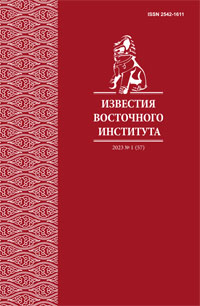Mongolian politics of memory in the late 2010s and early 2020s: actors, topics and development prospects
DOI:
https://doi.org/10.24866/2542-1611/2023-1/131-146Keywords:
historical memory, politics of memory, memorial canon, image of Genghis Khan, institutions of memoryAbstract
The purpose of the article is to analyze the politics of memory in modern Mongolia of the early 2020s. The
article is based on the principles of the memorial turn and belong to the paradigm of intellectual history. The novelty of
the study lies in the analysis of common and unique features and directions of historical politics as a politics of memory
in modern Mongolia, because studies of non-European cultures of memory in international historiography develop in a
lesser extent in comparison with the same processes in memorial cultures of Western societies. The article analyzes
1) discursive-narrative strategies of memorial culture in contexts of the development of state narratives in the actual
canon of the collective memory of Mongolia, 2) anniversary events as a form of state-controlled historical politics, 3)
features of the politics of memory in its institutionalized forms. The results of the study suggest that the political elites
are among main actors of historical politics and the inspirers of memorial culture because they legitimize their status
with the help of various memory tools, including discursive-narrative practices based on the mythologization of the past
and its instrumental understanding and application in modern politics.




